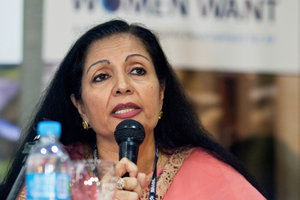UN Official Urges More Rapid Change for Gender Equality
 |
| Deputy Executive Director of UN Women Lakshmi Puri. [UN Women/Fabricio Barreto] |
A senior United Nations official stressed the need for more rapid advancements on gender equality on March 17, saying the pace of change since the 1995 World Conference on Women, held in Beijing, on many issues has not been sufficient and major disparities between genders remain.
Speaking at an event held on the margins of the current session of the UN Commission on the Status of Women, Lakshmi Puri, Deputy Executive Director of UN Women, said the world had witnessed "numerous improvements" in women's lives in fields such as employment and education since Beijing but equality was still elusive.
"No sector or country has met the standards laid out in Beijing, where gender equality is a reality," she said. "While we should rejoice at the progress made when we look back and see where we are at present, we do have to convey a strong message … that we need to take every step, every measure, every law, every programme in order to push the pace and push the envelope on this issue.
"Otherwise, we are going to take almost another century to get to Planet 50:50 by 2030. This is absolutely not acceptable."
She called for evaluation of the progress achieved but also of the gaps, with a focus on what the challenges have been and on how to get to Planet 50:50 by 2030.
The Beijing Platform for Action, she noted, mandated the full participation of women in the public, private and governmental realms.
"It also affirms that the equal and active participation of women is fundamental for the achievement of equality, development and peace," she said, going on to note the demands it made of the UN system as well.
She said responsibility for implementing the Platform lay at the highest level and she pointed to the proven importance of the role of senior leaders in catalysing and bringing about change, highlighting Secretary-General Ban Ki-moon as a good example of a leader who had stood behind positive change.
Even within the UN system, the situation of women faced significant challenges and had not achieved the aims of the Beijing Platform, noted Ms. Puri.
"Good progress but not enough," she said, adding that the slow rate meant it would take until 2043 for some parts of the UN to achieve full gender parity. "So even we are not going to be able to say 50:50 by 2030 if we do not speed up."
Deborah Gillis, the CEO of research advisory organisation Catalyst, described the research her company has done and the significance of the data produced.
"Clearly there's so much work ahead," she acknowledged, noting significant movement in the percentages of women in several sectors of economies but adding that the extent of those moves had been nowhere near the expectations. "The picture that emerges from this data is that we have failed to make the significant progress that we'd hoped to."
She considered the work needed to shift that picture and accelerate change, and called for leadership commitment and individual intent. She also underlined the importance of engaging men and abandoning the idea that gender equality was an issue about women, for women, run by women.
"It really must be a multi-sector focus for us to really see the kinds of achievements that we really all are in for," she said. "Men need to be core to that conversation. We need to find more ways to empower them to make change happen."
(Source: un.org)
Please understand that womenofchina.cn,a non-profit, information-communication website, cannot reach every writer before using articles and images. For copyright issues, please contact us by emailing: website@womenofchina.cn. The articles published and opinions expressed on this website represent the opinions of writers and are not necessarily shared by womenofchina.cn.

 京公网安备 11010102004314号
京公网安备 11010102004314号